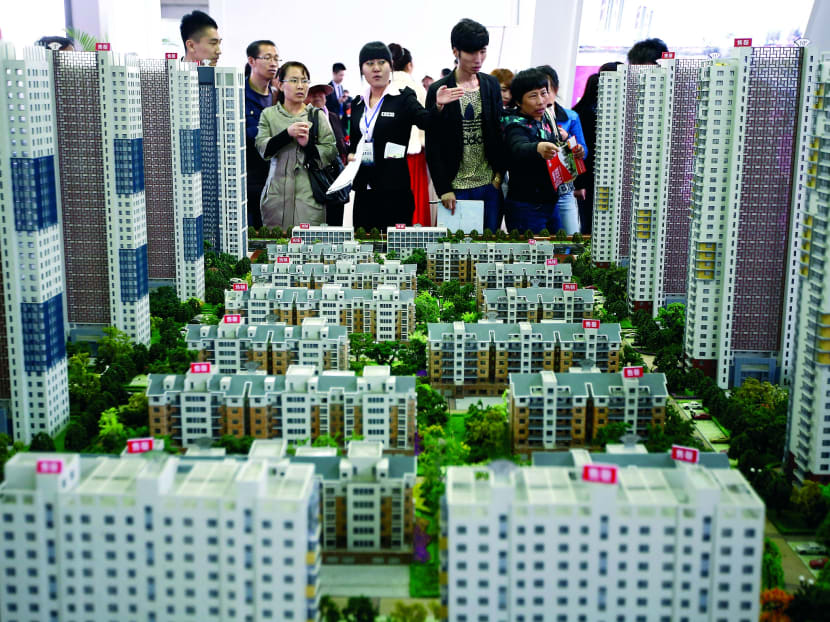China’s property bubble has burst: Economists
BEIJING — China’s property bubble has burst and growth in Asia’s largest economy could slow sharply to less than 6 per cent this year unless the government steps in with fresh stimulus measures, economists at Nomura securities brokerage warned yesterday.

Real estate and related industries account for about a fifth of China’s total economic output. A rapid cooling of home prices will slow growth and in turn hurt its trading partners.
Photo: Reuters
BEIJING — China’s property bubble has burst and growth in Asia’s largest economy could slow sharply to less than 6 per cent this year unless the government steps in with fresh stimulus measures, economists at Nomura securities brokerage warned yesterday.
“It is no longer a question of ‘if’, but rather ‘how severe’ the property market correction will be. We are convinced that the property sector has passed a turning point,” the economists said in their research report.
Real estate and related industries account for about a fifth of the country’s total economic output. A rapid cooling of home prices will slow growth in China and in turn hurt its trading partners.
Nomura said four provinces in north China — Heilongjiang, Jilin, Inner Mongolia and Gansu — are leading indicators of the deepening problems in the real estate sector, with property investment having turned negative in the first quarter while industrial output slowed. In Heilongjiang and Jilin, property investment plunged by more than 25 per cent from the previous year.
The government is caught in a bind, said Nomura. If it stays the course and refrains from major stimulus, China’s economic growth could fall below 6 per cent this year, well short of the 7.5 per cent official target.
If it eases monetary policy, steps up fiscal stimulus and loosens property sector measures, growth could touch 7.4 per cent. However, this would worsen the current housing oversupply and delay the downturn by a year. This would result in a one-in-three chance of a hard landing by the end of next year, which Nomura defines as growth below 5 per cent for four straight quarters. In its base case, Nomura forecast Chinese gross domestic product to slow to 6.8 per cent next year.
“Painful adjustments in the sector seem inevitable in the longer run,” the economists said.
Meanwhile, more Chinese cities are rolling out measures to encourage home purchases, effectively reversing a near-five-year-old policy of reining in the property market. Ningbo, the coastal city of eastern Zhejiang province, has relaxed home purchase restrictions, the official China Securities Journal newspaper reported yesterday, citing a local industry association.
Tongling in Anhui province has introduced steps including providing tax subsidies to first-home buyers and cutting down-payment rates to 20 per cent from 30 per cent for certain buyers, the city government said on Monday.
The latest moves follow recent similar measures by three other cities — Nanning, the capital of Guangxi province; Wuxi in Jiangsu province; and Hangzhou, the capital of Zhejiang province — to ease rules for buying homes or land.
So far, the turnaround in China’s housing policy has been confined to several cities. Local governments do not always have the support of the central government when loosening housing controls. Back in 2012, Beijing forced governments in areas including Wuhu, Foshan and Chengdu to retract plans to ease real estate curbs. Yet, analysts expect Beijing will approve the easing measures this time, in line with its preference to tailor policies for different local economies in China.
UBS economists said: “If property activity weakens further, we think the central government may allow various local governments to relax home purchase restrictions and cut down the current hefty down-payment requirements.”
China’s home prices rose at double-digit rates in most cities last year, but the market started cooling late last year as the authorities clamped down on speculation and as banks made it harder for buyers and developers to get loans.
Data from the land ministry last month showed residential land price inflation cooled for the first time in nearly two years in the first quarter.
New home sales in terms of floor space in 54 major cities dropped 25 per cent in the first four months of this year from the same period a year ago, showed data from property agency Centaline. The trend of easing demand for housing continued early this month. These cities saw home sales fall 47 per cent from a year earlier in the first three days of this month during the Labour Day holiday, it added.
“There are increasing concerns of a turning point for the property market. We expect the central government would react differently this time,” said Centaline head of research Liu Yuan. AGENCIES





